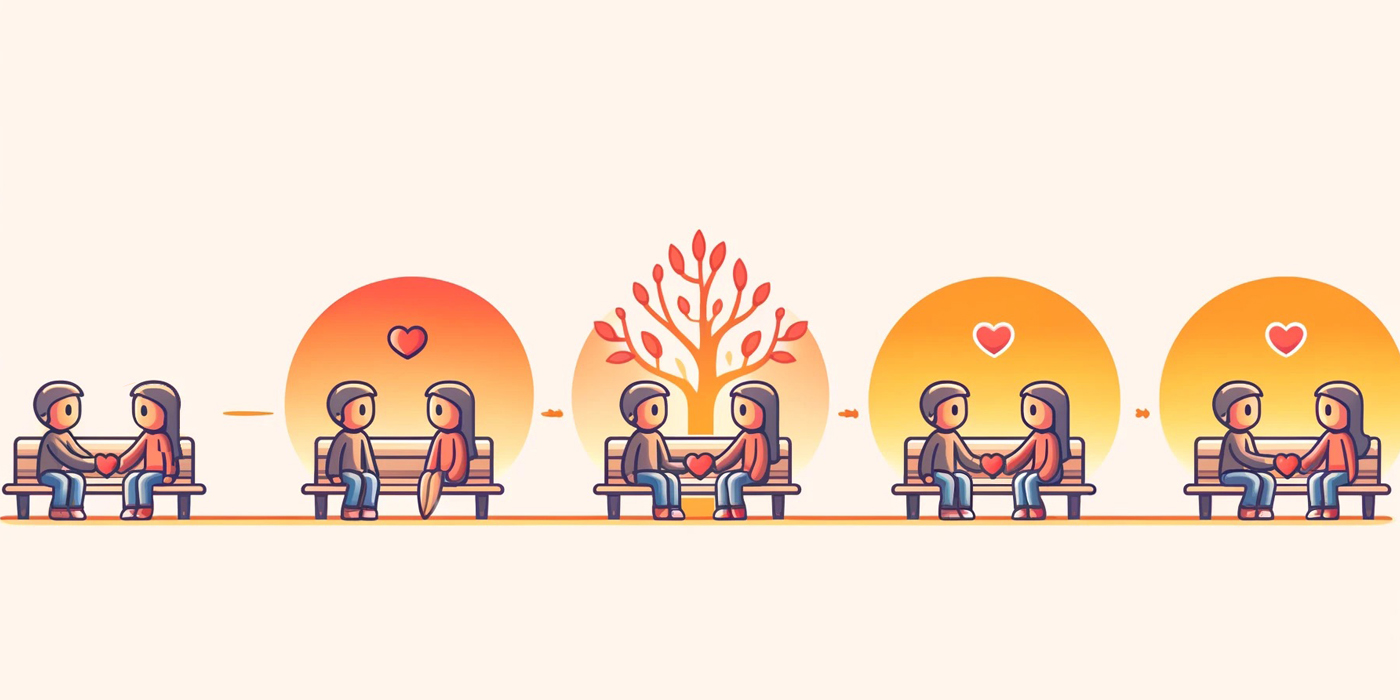
My name is Dave, I’m a recovering sexaholic, and I’ve been sexually sober since August 1, 1985 by the grace of God and this wonderful Fellowship. I came into the Fellowship when I separated from my first wife hoping to save my marriage. After two years of sobriety, we still divorced, and by the grace of God, I knew absolutely that I had no business being in any kind of romantic relationship, much less a committed one. That clarity came while attending meetings at a facility that counseled people from alcoholic families. I was a year and a half sober at the time. I realized that my own family had been alcoholic, so I began to see a therapist there. That’s when I heard a cassette tape about codependency and dating; the talk outlined a healthy approach to dating in recovery.
I didn’t have a clue about healthy relationships. I have never even thought about it. I learned on this tape that healthy relationships progress from acquaintanceship to companionship and then to love. The shocker to me was that romantic touch is only appropriate after a relationship has progressed through the first two stages. What a concept! All I knew was to sample the physical part as quick as possible. Acquaintanceship and companionship? Why bother?
The speaker went on to describe each stage separately. In acquaintanceship, an activity is more important than the person I share it with. When I started dating at four and a half years of sobriety, this looked like me asking someone to take a walk in the local park. In companionship, the person becomes more important than the activity. Once we found that we shared common interests and began to share deeper information about ourselves, companionship tended to develop.
I also learned about the speaker’s 10-date rule: don’t discuss your addiction or recovery until after 10 dates. I’ve come to modify this rule such that I shared about my recovery only when a casual acquaintanceship looked like it was turning into a companionship and then ONLY in regular consultation with HP and my sponsor. I only ever shared my recovery with two women over my six years of sober dating. And I only shared my complete story with the woman I wanted to marry. My sponsor was on board that I would share my story and answer all her questions before holding her hand. I continued to enjoy this companionship for a few months before I said I loved her, and I kissed her for the first time.
Knowing me so well after helping me through the Steps, my sponsor would push me, and he also reined me in when I needed it. A good example was whenever I met someone I thought was interesting, he’d say, “Okay, you’re asking her to take a walk, not get married!”
I maintained a number of boundaries during my dating years:
- I didn’t date people from work or recovery so I could stay focused in both arenas.
- I didn’t date people that triggered my lust.
- I dated several people at the same time since most never progressed out of the acquaintanceship stage.
- I limited the frequency of dates with each woman because one of my character defects was (is) to overwhelm people by depending on them to meet way too many of my needs.
A key moment of clarity occurred four years into my dating when I was 42. Having had no relationships that progressed beyond the acquaintanceship stage, I realized that I really did have a very good life! I was approaching nine years of sobriety, I was doing service work in the Fellowship, I had a good job and good friends (mostly in recovery), and I was active in my church. Even if I didn’t get married, I could remain happy and be at peace. Only after I accepted the joy the Program had brought me and surrendered my desire for yet more did I meet my wife. We dated for a year and a half, and we’ve now been married for 28 years and have two wonderful sons.
This is my advice to any single member in the Fellowship:
- Focus completely on getting sober and working the Steps with your sponsor.
- After some sobriety, consult with your sponsor (and HP) about working with a therapist on family relationship issues that may have gotten distorted.
- When that has yielded some confidence, discuss the idea of dating in order to develop a companionship.
I found successful relationships only after years of healthy sober dating and only after I worked my recovery, worked on myself, and committed to work the Program for the rest of my life.
Dave H., Tennessee, USA






